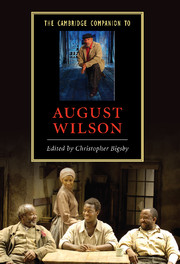Book contents
- Frontmatter
- 1 August Wilson: the ground on which he stood
- 2 Been here and gone
- 3 August Wilson’s relationship to black theatre: community, aesthetics, history and race
- 4 Music and mythology in August Wilson’s plays
- 5 Gem of the Ocean and the redemptive power of history
- 6 Joe Turner’s Come and Gone
- 7 Ma Rainey’s Black Bottom: cutting the historical record, dramatizing a blues CD
- 8 A piano and its history: family and transcending family
- 9 The tragedy of Seven Guitars
- 10 Safe at home?: August Wilson’s Fences
- 11 Two Trains Running: blood on the tracks
- 12 Jitney, folklore and responsibility
- 13 King Hedley II: in the midst of all this death
- 14 Radio Golf: the courage of his convictions - survival, success and spirituality
- 15 Critics on August Wilson
- 16 An interview with August Wilson
- Index
16 - An interview with August Wilson
Published online by Cambridge University Press: 28 January 2008
- Frontmatter
- 1 August Wilson: the ground on which he stood
- 2 Been here and gone
- 3 August Wilson’s relationship to black theatre: community, aesthetics, history and race
- 4 Music and mythology in August Wilson’s plays
- 5 Gem of the Ocean and the redemptive power of history
- 6 Joe Turner’s Come and Gone
- 7 Ma Rainey’s Black Bottom: cutting the historical record, dramatizing a blues CD
- 8 A piano and its history: family and transcending family
- 9 The tragedy of Seven Guitars
- 10 Safe at home?: August Wilson’s Fences
- 11 Two Trains Running: blood on the tracks
- 12 Jitney, folklore and responsibility
- 13 King Hedley II: in the midst of all this death
- 14 Radio Golf: the courage of his convictions - survival, success and spirituality
- 15 Critics on August Wilson
- 16 An interview with August Wilson
- Index
Summary
This interview was conducted in London, in November 1991, on the occasion of the National Theatre's production of Ma Rainey's Black Bottom.
BIGSBY You were born in Pittsburgh in 1945. What sort of world were you brought up in?
WILSON Actually I lived in a mixed neighbourhood. There were, as I recall, quite a few Syrians, Jews, Italians and blacks, all mixed together. It was very interesting.
BIGSBY Does that mean that you were insulated from segregation?
WILSON It doesn't mean that at all because one encounters that early on. I suspect that from the time one is about seven or eight one begins to notice that all the people who are in positions of authority, whether it is the owner of the grocery store, the landlord, the teachers at the school, the bus drivers, or the people downtown in the shops and stores, all these people are white. So one begins to notice that early on, even though one may not quite understand it. So you are isolated.
BIGSBYLooking back, can you recall what it was like as a child, slowly becoming aware of this process?
WILSON I suspect my first raw encounter with racism was when I was fourteen. Every day when I went to school there was a note on my desk saying, 'Go home, nigger'. That was my first encounter with both individual and institutional racism.
- Type
- Chapter
- Information
- The Cambridge Companion to August Wilson , pp. 202 - 213Publisher: Cambridge University PressPrint publication year: 2007
- 2
- Cited by

